Nutters vs. Nutters
Two days ago I ran a 2004 sum-up piece about the year’s best and worst, but I may have spoken too soon. That same day a completely riveting documentary arrived in the mail from Telluride Film Festival director Tom Luddy, who told me the next day that it might be “the most important film of 2004.” And he may be right. At least in a political vein.
It’s called The Power of Nightmares. It’s written and produced by the BBC-funded documentarian Adam Curtis, who also made the brilliant four-hour doc The Century of the Self. I raved about this knockout film a year and a half ago after seeing it at the `03 San Francisco Film Festival, and now here we go again. Curtis has a sharp mind and a fresh way of seeing things, and is putting a lot more on the table than just flashy provocation.

This new three-hour doc weaves together all sorts of disparate historical strands to relate two fascinating spiritual and political case histories, that of the American neo-conservatives and the Islamic fundamentalists. The payoff is an explanation of why they’re fighting each other now with such ferocity (beyond the obvious provocation of 9/11), and why the end of their respective holy war, waged for their own separate but like-minded motives, is nowhere in sight.
That’s right — the Islamics vs. the neo-cons. You might think the United States of America is engaged in a fierce conflict with Middle-Eastern terrorists in order to prevent another domestic attack, but what’s really going on is more in the nature of a war between clans. Like the one between Burl Ives vs. Charles Bickford in The Big Country, say, or the Hatfields vs. the McCoys.
< ?php include ('/home/hollyw9/public_html/wired'); ?>
It’s not that Curtis’s doc is saying anything radically new here, certainly not to those in the hard-core news junkie, academic or think-tank loop, but it makes its case in a remarkably well-ordered and comprehensive way, which…you know…helps moderately aware dilettantes like myself make sense of it all.
The film contends that the anti-western terrorists and the neo-con hardliners in the George W. Bush White House are two peas in a fundamentalist pod, and that they seem to be almost made for each other in an odd way, and they need each other’s hatred to fuel their respective power bases but are, in fact, almost identical in their purist fervor, and are pretty much cut from the same philosophical cloth.
It says, in other words, that Bush, Dick Cheney, Donald Rumsfeld and Paul Wolfowitz have a lot in common with Osama bin Laden. It also says that the mythology of “Al-Qeada” was whipped up by the Bushies, that the term wasn’t even used by bin Laden until the Americans more or less coined it, and that the idea of bin Laden running a disciplined and coordinated terrorist network is a myth.


Nightmares producer-writer Adam Curtis (l.); a non-related plaque outside a BBC office.
Nightmares doesn’t trash the Bushies in order to portray the terrorists in some kind of vaguely admiring light. It says — okay, implies — that both factions are too in love with purity and consequently half out of their minds.
This conclusion leaves us with a feeling that we ought to stand up and act like good reasonable Gregory Peck-styled liberals and separate ourselves from these guys and their nutbag holy war, and maybe send the Islamics and the neo-cons off to a desert island and let them fight it out alone with clubs and knives.
The neo-cons and the Islamists “believe that the main problem with modern society is that individuals question everything,” Curtis told a reporter for London Time Out last October, “[and] by doing that the questioners have already torn down God, that eventually they will tear down everything else and therefore they have to be opposed.”
In other words, they’re both enemies of liberal thought and the pursuit of personal fulfillment in the anti-traditionalist, hastened-gratification sense of that term. They believe that liberal freedoms have eroded the spiritual fabric that has held their respective societies together in the past. Curtis’s doc shows how these two movements have pushed their hardcore agendas over the last four or five decades to save their cultures from what they see as encroaching moral rot.
I genuinely feel that Curtis’s film is more wide-ranging and sees right into the heart of these warring ideological beasts in a much sharper and more revelatory fashion than Michael Moore’s Fahrenheit 9/11.
You will probably never see this doc on American broadcast television and perhaps not even on any U.S. cable channels, but there’s something about Curtis’s pointed, relentless and irreverent British perspective that seems to cut right through the cobweb of our perceptions and draw a bead on what’s really happening.
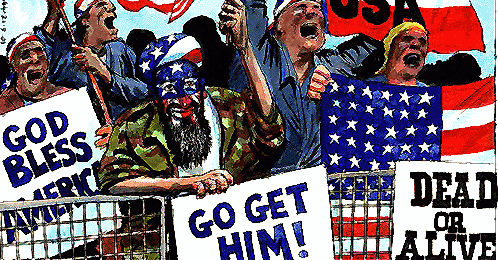
The Power of Nightmares showed on BBC2 in three one-hour installments just a few weeks ago, in late October and early November.
The three chapters are titled “Baby, It’s Cold Outside”(about the growth of both camps from the `50s through the `80s), “The Phantom Victory” (about the Reagan years and how the Neo-Cons and the Islamics got together in battling the Russians during the Afghanistan War) and “Shadows in the Cave” (about how things have gone from 9.11 until the present).
The likelihood is that no one except for certain people I happen to know (or whom Luddy happens to know) is going to see it this year, so let’s kick back and call The Power of Nightmares one of the most important films of 2005.
I’ve been telling various industry lefties about it, and maybe it’ll turn up at the forthcoming Santa Barbara or San Francisco Film Festivals. There are indications that it might.
Same Difference
This is one of those curious-coincidence stories, as opposed to being one about a pair of studios looking to shoot films based more or less on the same story, which is fairly common in this town.
Two high-profile directors — Vadim Perelman (House of Sand and Fog) and Paul Weitz (In Good Company, About a Boy) — are both planning to make (or produce, in the case of Weitz and his brother, Chris) a movie about the brief Christmas truce that happened between British and German soldiers in 1914 somewhere around Belgium in the early days of World War I.

Perelman’s project is called The Truce. I wasn’t told what the literary source material is, but Collateral screenwriter Stuart Beattie wrote the script, casting is now underway, and the studio backing is from Warner Independent.
The Weitz film, Silent Night, is based on a book about the truce that has the same title and was written by Stanley Weintraub. The book has been adapted into screenplay form by Jon Robin Baitz (People I Know). The Weitz’s partner Andrew Miano, who runs their Depth of Field production company, would produce along with Paul and Chris. The funding would come from Universal, and the plan is to shoot it somewhere in Europe.
Miano says no one’s pulling the trigger just yet, although he says he and the Weitz brothers have been working on Silent Night longer than Perelman has been developing his version. He says they intend to hire a director for their project right after the holidays.
What’s interesting is that New York Times reporter Sharon Waxman just happened to mention the idea of a Christmas truce movie in a story about Xmas flicks that ran last Tuesday, without knowing about the Weitz or Perelman projects.
The concept came from a conversation Waxman had with David Thomson (author of the just-released The Whole Equation) during her research for the story.
“Mr. Thomson has tried, so far unsuccessfully, to interest Hollywood decision makers in a Christmas story from World War I that he first heard as a child,” Waxman wrote. “The story goes that one morning on Dec. 25, after months of warfare across German-English battle lines, the soldiers decided to lay down their arms, come out of the trenches and mingle and play soccer, just for the day.
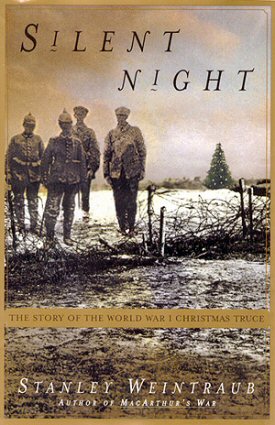
“‘I’ve been trying to sell it to people for ages,’ Mr. Thomson said. `But they say: ‘I don’t know. People wouldn’t believe it happened.'”
Last Tuesday night I went to a screening of Million Dollar Baby (my third) on the Warner Bros. lot, and I happened to run into Perelman at the after-party. I asked him what was happening and he told me about The Truce, but asked that I not write about it. The next day I called Thomson and told him about the Perelman project, which I knew he’d be interested in, and then I called Waxman about it, and she told me about the Weitz project.
The appearance of Waxman’s Times story followed by the revealing of the duelling truce movies changed the dynamic — it’s a conflict story, a coincidence, and a turning-of-the-wheel all at the same time. The upshot is that I’m running this story despite Perelman’s request. He may be pissed off at me for doing so, but this information would have surfaced sooner or later, and probably sooner.
And by the way, there’s an excellent, unsentimental British animated film about the Christmas truce that’s viewable online.
Standout
In The Morning, a short film that will play at the 2005 Sundance Film Festival, is tight and hard and true to itself in more ways than one. I probably shouldn’t get into it too deeply, but it has to do with honor killings, a grotesque phenomenon in which young women who have been raped are put to death by the men in their families so as to preserve family honor.
Yes, it happens routinely…and not just in fundamentalist Middle-East cultures.
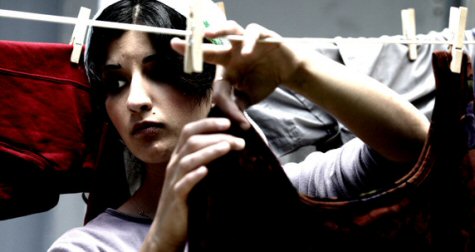
I’m mentioning In The Morning not just because it’s a solid, well-crafted effort, or because the 9-minute, 59-second short is performed in Turkish, even though no one among the cast or crew was a Turkish-speaking native. (The film was shot in Los Angeles.) And I’m not running this solely because the writer-director is Danielle Lurie, the younger sister of writer-director Rod Lurie (The Last Castle, The Contender), who’s been a friend for the last ten years or so.
I’m running this because Danielle’s movie really got to me, and because she’s in the process of putting together a feature-length version, which I’m sensing will also be a strong thing, and because films about honor killings need to be made and seen, for obvious reasons.
Bel-Air Horrors
Speaking of despising liberal values, James L. Brooks’ Spanglish made me want to forget my blue-state attitudes and turn myself into an Okie from Muskogee. I wrote in the WIRED section that for years to come red-state politicians will point to this film and say, “This is what’s wrong with liberal lifestyles.” And there will be no argument.
Such is the power of Tea Leoni’s portrayal of Deborah Clasky, arguably the most diseased and over-pampered Type-A nightmare woman in the history of motion pictures. I am putting it very, very delicately when I say that Deborah makes the watching of Spanglish (Columbia, now playing) a chore. Her hyper-neurotic manner and chalk-on-a-blackboard affectations are so deplorable that you just want her gone…or you want to get yourself gone from the theatre. There’s no third way.

I’m going to paraphrase a line that Anthony Quinn said in The Guns of Navarone : “One bullet now. Better for her, better for us.”
The odd thing is that Brooks, who reportedly had a hard time getting this totally dreadful performance out of Leoni during shooting, seems to be encouraging this reaction.
He’s clearly in love with Flor (Paz Vega), the Mexican mother of twelve-year old daughter (Shelbie Bruce) who becomes the housekeeper for the Clasky’s (Adam Sandler is the husband, a well-off highbrow chef with a laid-back manner). And he obviously wants us to sympathize with Flor’s not wanting her daughter to be corrupted by upscale liberalism. Leoni is obviously there to represent the other side of the scale…the wacked queen.
Who could have predicted that Brooks, a respected chronicler of the difficult lives of extremely bright, neurotic-eccentric but also charming and/or impassioned people of a sensitive liberal bent…who would have guessed that a director-writer known for his open-to-delicate-feelings, westside-of-Los-Angeles attitudes in his films….who could have foreseen that Brooks would make a comedy-drama that clearly frowns upon and in fact, through the eyes of Flor, clearly condemns the affluent, neurotically afflicted way of life represented by the Clasky’s?
Except Brooks is a longtime Bel-Air rich guy who (rumor has it) was once married to a woman who vaguely fit the Deborah Clasky mold, so what’s he saying here? He hates what he represents, hates himself for marrying her…? It feels unresolved.
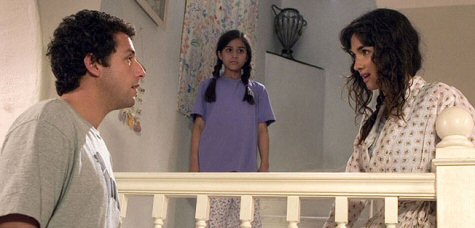
I certainly don’t believe that a woman like Flor would be this strongly averse to having her daughter hang out with the rich and go to a rich-kid’s private school. I don’t believe she’d have that kind of integrity. Money is hard to come by, no? And wouldn’t removing her daughter from a rich kid’s school rob her of all kinds of opportunities, scholastic and otherwise?
One thing that’s driving Brooks, I’m guessing, is a case of the deep-down hots for Flor. Remember Inez, the pretty Venezuelan non-English speaking motel maid in Wes Anderson and Owen Wilson’s Bottle Rocket? Brooks, the producer and godfather of that 1995 film, made sure that Wes and Owen dipped heavily into the relationship angle between Inez and Anthony (Luke Wilson) during the development process. I remember saying to myself after hearing that Spanglish would be about a non-English-speaking Mexican domestic, “Uh-huh…there he goes again.”
The reason I think Brooks has a case on the character is because he presents her in totally non-sexual, virginal-earth-mother terms in the film. In other words, he’s in denial. Only a blocker could photograph (much less work with) Paz Vega and not acknowledge her sexual energy on some level. Check out those photos of her in the January 2005 Esquire…c’mon.
I love this line about Sandler from Village Voice reviewer Dennis Lim: “The beauty of Sandler’s performance — a superbly modulated suite of crestfallen groans and grimaces — is that he often seems to be reacting not just to his crazy wife but also to the dismal movie he’s stuck in.”


Paz Vega on page 105 and 107 on the January ’05 Esquire
There’s absolutely no believing in these two as a married couple. The notion that a relaxed curly-haired Jewish guy like Sandler might have ever been attracted to, much less found a way to groove with, an insecure wackjob shiksa like Leoni is beyond my absorption levels. There’s just no accepting that this woman was ever sane in her entire life (not even when she was six or seven), or that she’s ever going to change or mellow out to any significant degree.
When Sandler goes back to Leoni at the end after flirting with Flor for a single innocent evening (which doesn’t amout to anything meaningful for us or them), you feel deeply sorry for him. He’s goes back to be with their daughter and, I guess, to protect her from Leoni, but he’s going to get grayer a lot sooner in life because of this choice, and you know he’ll probably die sooner unless he finds the courage to leave her.
Not a pretty picture, and that’s where the movie leaves you at the end. Great.
If It Bends…
It’s interesting to consider how a scene involving cold-blooded murder of an unarmed person can seem appropriately dark and disturbing in one film, but how the depiction of the same thing in another movie can seem oddly comedic.
Deranged as this may sound, this is the difference between two similar moments in Francis Coppola’s Apocalypse Now (1979) and John Moore’s The Flight of the Phoenix (20th Century Fox, opening today).
How did Alan Alda’s obnoxious celebrity character put it in Woody Allen’s Crimes and Misdemeanors? “Comedy is tragedy plus time. If it bennnds, it’s funny. If it doesn’t bend, it’s not.” Or something close to that.
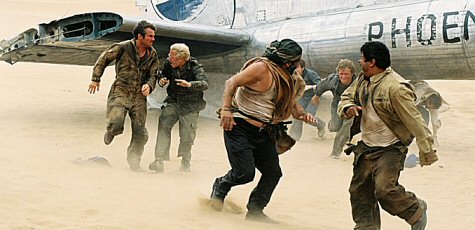
I’m not going to describe the Phoenix scene in any detail, but I can say without hesitation that I laughed out loud at it, and so did a bunch of other guys in the screening I attended last Wednesday evening, and the notion of laughing at a scene in which a guy is shot to death gave me pause immediately following, but c’est la cinema.
It is without question the most memorable scene in the film, which, you may have heard, is a passable adventure thing.
The Apocalypse Now scene happens when a young Vietnamese girl on a small sampan has been wounded by machine-gun fire fired by Lawrence Fishburne’s Clean character, prompting Albert Hall’s top sergeant to call for medical attention. This in turn prompts Martin Sheen’s Cpt. Willard, who won’t accept a delay in his mission to travel upriver into Cambodia and kill Marlon Brando, to raise his pistol and kill the girl with a single shot.
A very sad and upsetting scene, but believe it or not the same action is played for laughs in Phoenix, and it works. I’d like to know if people are laughing at this scene in commercial showings this weekend.
Tribute
I’ve been putting this off and I shouldn’t have. I want to pay tribute to the guy who did the cool new re-design of Hollywood Elsewhere, which I think looks pretty damn good. His name is Christopher Risdon and I owe him big-time.
Chris was a marketing type and internet strategist in Seattle and London previously. After six years of doing this he decided he wanted to go from telling people what to create to actually creating himself. He became a print and interaction designer two years ago and is currently finishing his MFA in Graphic Design and MA in Interactive Design.
He now combines his previous life architecting web sites with his current life designing them through his design studio, Live By Satellite (http://www.livebysatellite.com). Some of his recent projects include www.zoccadesigns.com and www.screwidea.com. His email is chrisrisdon@mac.com.
Airplane Seats
“I’m with you on the lean-all-the-way-backers. What gets me more inclined to a fistfight is incessant talkers during movies in theatres. I find the problem much worse out here in the supposed film capital of the world than where I grew up in the simple, mouth-breathing red-state southeast. I think it’s a combo of indifferent parenting and gross egocentrism, which maybe explains why I see it more in SoCal?” —Jason Williams, Garden Grove, CA.
“Oh, so you’re one of those assholes. The ones who think that the person leaning their seat back is rude, the ones who believe it’s their right to have the person in front of them not lean their seat back.
“Let me tell you this — you can make all your contentions about necessary personal space etc., but I believe there’s a stronger case for necessary comfort by being able to lean back as far as I fucking want in those goddamn airline seats without one of you whiners behind me. And I never have a problem with the person in front of me leaning back — because it’s their right and it would be rude of me to complain.
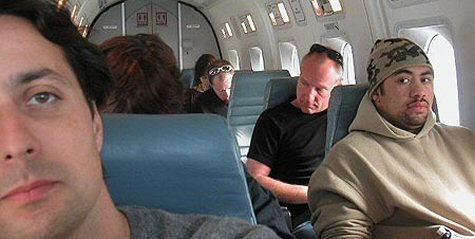
“I don’t lean back all the way while meals are being served, but I’ve also been able to eat with someone in front of me leaned back. I’m not sympathetic to your laptop complaint. I don’t understand you guys.
“And I’ll never forget the flight to Europe I took where the asshole behind me had his knees deliberately jammed into my seatback the whole way so I had to remain completely upright for six hours. I glared; he smugly smirked. Who was being rude? Who had manners?
“By the way, you should fly American. They really do have more room in coach.” — Jay Smith
Wells to Smith: I’m totally with that guy who had his knees jammed in there….he’s my bro.
Smith back to Wells: “A curse on your family then!”
“My equivalent beef is over people who will insist on using the empty seat next to them on a bus or a subway to put their bags. Even when it’s rush hour and seat spaces are a premium. Now me, I try to be considerate of the fact that there are other human beings that ride public transit and put my bags (or in some cases, big honking boxes, like when I bought my first DVD player) on my lap.
“It’s a little uncomfortable for me, sure, but it sure beats feeling like a heel who won’t allow someone else to sit down just so I can let people know I’ve gone shopping.
“More power to ya! If you are ever on a plane and hear someone clapping after you’ve laid into someone for leaning their seat back all the way so their head is basically resting in your lap, you never know, it just might be me saying `Right on, Jeffrey’!” — Christopher Hyatt













